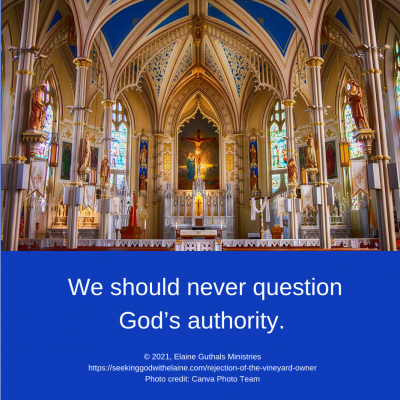The Parable of the Vineyard Owner was one of the last parables recorded in Luke, but it is something we need to hear today. This daily devotional looks at the tenant’s treatment of the vineyard owner’s servants and how they reject His authority.
Nuggets
- The members of the Sanhedrin and the Herodians questioned Jesus’ authority.
- By killing the vineyard owner’s servants, the tenants were rejecting his authority.
Devotions in the Luke’s Diagnosis and Prescription series
Devotions in the Parable of the Vineyard Owner series

The Parable of the Vineyard Owner is an important one. Not only is it the second to last parable recorded in Luke, but it also has an important message for those questioning God’s authority.
Let’s put it this way. The members of the Sanhedrin and the Herodians did not enjoy getting called on the carpet. The outcome of this teaching was they wanted to immediately arrest Jesus.
Let’s take a look at the first part of the parable. We will finish it up in the next devotion. We’ll do the connections and application then.
Let's Put It into Context
“One day as he was teaching the people in the temple and proclaiming the good news, the chief priests and the scribes, with the elders, came and said to him, ‘Tell us, by what authority are you doing these things? Who is it who gave you this authority?’ He answered them, ‘I will also ask you a question. Tell me, was the baptism of John from heaven or of human origin?’ They discussed it among themselves: ‘If we say, “From heaven,” he will say, “Why didn’t you believe him?” But if we say, “Of human origin,” all the people will stone us, because they are convinced that John was a prophet.’ So they answered that they did not know its origin. And Jesus said to them, ‘Neither will I tell you by what authority I do these things.’” (Lk. 20: 1-8 CSB)
The members of the Sanhedrin and the Herodians questioned Jesus’ authority.
The religious rulers really didn’t like Jesus. He threatened their status quo.
They were expecting Jesus to give them an attaboy. Well, they were trying to follow all of God’s laws and commandments, weren’t they?
Jesus did the exact opposite.
Thomson stated that the Pharisees had combined forces with the Herodians to oppose Jesus. This was significant because the Pharisees hated the Herodians.
Resource
I love how Jesus often answered a question with a question. “If you are so smart, riddle me this.”
Clarkson thought the Sanhedrin had a legitimate position that allowed them to ask the question. He wrote, “It was a legally constituted body, and one of its functions was to guide the people of the land by determining who was to be received as a true Teacher from God.”
Resource
Fun Fact
It seems logical that the people in authority would question this person who was claiming authority where it was coming from – at least from the worldview standpoint. That falls apart when we realize the person was the Person Who has all authority (Mt. 28: 18).
We should never question God’ authority.

Clarkson said, as a court, they really needed to reach a verdict about John the Baptist – and before Jesus offered His opinion. What would they look like if they didn’t? A court that wouldn’t rule.
But there was the underlying case of entrapment here. The Sanhedrin wasn’t totally concerned with the truth and righteousness of answer. They wanted a divisive answer in which they could accuse Jesus.
Edgar reminded us how connected Jesus’ ministry was with John’s ministry. From the baptism to John corralling disciples for Him, the connection was strong. We can see that in how Jesus lovingly talks to John when he is having doubts (Mt. 11: 1-15).
Resource
This was a good precursor to the answer to the question asked to Jesus. Both questions had the correct answer of “God sent us.”
The Sanhedrin became an ineffective court that had fallen away from its mission to identify messages from God. So, Jesus wouldn’t answer their question outright.
Questioning God’s Authority
“Now he began to tell the people this parable: ‘A man planted a vineyard, leased it to tenant farmers, and went away for a long time. At harvest time he sent a servant to the farmers so that they might give him some fruit from the vineyard. But the farmers beat him and sent him away empty-handed. He sent yet another servant, but they beat that one too, treated him shamefully, and sent him away empty-handed. And he sent yet a third, but they wounded this one too and threw him out” (Lk. 20: 9-12 CSB)
By killing the vineyard owner’s servants, the tenants were rejecting his authority.
Well, Jesus answered their question in parable form.
We sometimes think of parables as being uninterpretable by non-believers. Maclaren pointed out that this wasn’t always the case. He contended that Jesus became very plain in His parables as the crucifixion drew near.
According to Maclaren, this parable contained it all – prophecy, history, urgency, indictment, and prediction. We can say without a doubt that the prediction came true and is still in effect today.
Resource
Jesus told the parable of a vineyard owner. This would have been understandable to His audience. Inhabitants of the region would have been familiar with, according to Thompson, an owner leasing his vineyard to tenants.
Resource
Isaiah 5: 1-7 talks about God being the owner of the vineyard. “For the vineyard of the Lord of Armies is the house of Israel, and the men of Judah, the plant he delighted in. He expected justice but saw injustice; he expected righteousness but heard cries of despair” (Isa. 5: 7 CSB). The members of the Sanhedrin would have known that.
When Matthew told the parable in his gospel, he gave more of the details that Jesus included. “Listen to another parable: There was a landowner, who planted a vineyard, put a fence around it, dug a winepress in it, and built a watchtower. He leased it to tenant farmers and went away” (Mt. 21: 33 CSB).
I think it is important that we have those details. It might be easy for some to say, from Luke’s version, that the owner just built it and turned it over. It looks like He doesn’t want to have anything to do with the vineyard.
That is not the case. God didn’t create us and then leave us to our own designs. We know God walked with Adam and Eve in the garden (Gen. 3: 8). God is still a hands-on Father.
They would also have known that the tenants were the Jews. God had given them an established vineyard. Maclaren wrote, “God had given Israel a system of revelation, law, and worship, which was competent to produce in those who received it, the fruit of obedience and thankfulness. The husbandmen are primarily the rulers, as the scribes and chief priests perceived; but the nation which endorsed, by permitting their action, is included.”
Resource
Because God has “… leased it to tenant farmers …” (Lk. 9: 9 CSB). Thompson pointed out that the tenants had a pretty good deal.
Trapp had an interesting sermon title (a lot more interesting than the sermon itself, but there you go). It was entitled Abused Mercy.
We talked in the last devotion about truth, along with faithfulness, being the avenue on which mercy is given. God’s mercy is an act of sovereign will that produces an unexpected response from God as He responds in love to our needs.
I think it is really important that the vineyard owner sent three different servants. Three is an important number in the Scriptures. It denotes harmony.
God didn’t give them just one chance to pay. He didn’t even give them one chance to pay and one chance to straighten up.
God gave them multiple chances.
God is faithful and loving. Those tenants were anything but. They were selfish, felt entitled, and downright mean.
However, those hired hands did not take kindly the the representatives the owner sent to collect the rents. They did some nasty things to the servants. Maclaren said that each servant was treated worse than the one before him.
Bottom line was they wanted something that was not theirs, and they didn’t want to have to work for it.
They truly were abusing God’s mercy.
Many worldview people think mankind has control over the earth. We don’t. God is still the owner.
Yes, God is no longer walking with us face to face in the cool of the evening. He is allowing Satan to have free reign at the present time.
Make no mistake. This life and its possessions are only on loan to us.
The rent will soon become due.
Father God. Lord, You are Sovereign God. You have all authority in Heaven and earth. Forgive us when we question Your authority and want to live our own lives. We praise You for Your love and mercy in dealing with us. Help us to submit to You, and help us to live lives according to Your Will. Amen.

What do you think?
Leave me a comment below (about this or anything else) or head over to my Facebook group for some interactive discussion.
If you don’t understand something and would like further clarification, please contact me.
If you have not signed up for the email daily or weekly providing the link to the devotions and the newsletter, do so below.
If God has used this devotion to speak with you, consider sharing it on social media.
Pingback: Rejection of the Vineyard Owner’s Son – Seeking God with Elaine